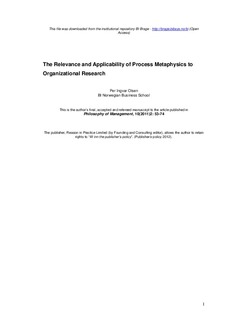The Relevance and Applicability of Process Metaphysics to Organizational Research
Journal article, Peer reviewed
Permanent lenke
http://hdl.handle.net/11250/93406Utgivelsesdato
2011Metadata
Vis full innførselSamlinger
- Scientific articles [2181]
Sammendrag
Process metaphysics (process philosophy) has been suggested as a route, to a more “process-based” approach to organizational studies, as opposed to a “substance-based” view said to be dominant in Western thinking - including most contemporary organizational researchers. This paper explores into some of the ideas of early 20th century process thinkers and provides an interpretation of some of the major work of Alfred N. Whitehead. The objective is to evaluate its possible relevance to modern organizational research. The paper argues that Whitehead’s radical ontology - that was based on a generalization of quantum theory in physics - appears largely to have been refuted or disregarded by succeeding process philosophers. Furthermore, his epistemology is found to represent a process view on scientific knowledge creation taken for granted by most contemporary researchers. For different reasons, major elements of his theories do not appear to be directly relevant to efforts to advance organizational theory into more radical process based theories.
On the other hand, the paper argues that the early 20th century process thinkers – including Whitehead - offer a plurality of analytical conceptions that may serve as useful and inspirational contributions to further development of methods and perspectives to investigate into organizations, change and innovation processes. There are also particular approaches within the domain that have properties quite similar to some of those conceptions in process philosophy – like “sensemaking processes” as represented by Karl Weick and others, which may in particular benefit from exploring the area of process philosophy.
Beskrivelse
This is the author’s final, accepted and refereed manuscript to the article
